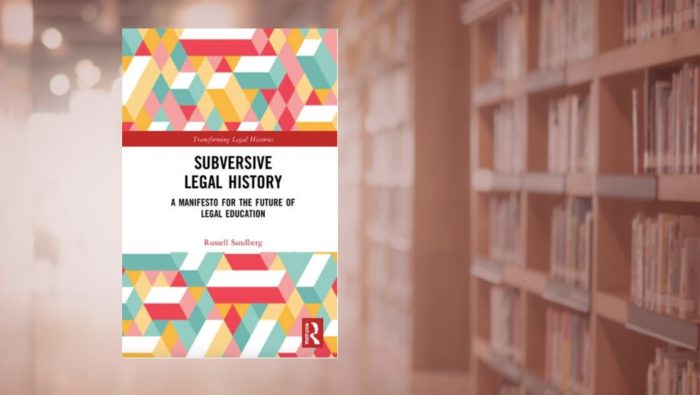
Subversive Legal History belongs in Law Schools

The book Subversive Legal History: A Manifesto for the Future of Legal Education by Professor Russell Sandberg has gained an impressive reputation in a short period of time, including being shortlisted for the Socio-Legal Scholars Association Theory and History prize (2022). Sandberg promises a manifesto to put subversive legal history at the heart of legal education. He begins this project by first outlining why the contextual, particularly the historical, is central to understanding law. In places the contextual felt too broad, offering up content that felt familiar. However, Sandberg does move into his manifesto argument swiftly. This argument is about a particular approach to the historical, which he calls subversive, and he spends considerable time explaining what this is, with a particular slant towards feminist subversive histories. He concludes by arguing that law should be studied through the lens of its subversive historical context.
In terms of writing style, I was entertained throughout by Sandberg’s effortless wit. When in Chapter 8 he consistently employs the metaphorical device of comparing legal teaching to religious orthodoxy I took pride in my heresy – he writes: “While the most obvious members of this priesthood are the textbook writers whose work continues to be produced in new editions, there have been other sacred texts which have been influential despite not leading to numerous editions” (p.206).
Sandberg starts his text with a broad-brush approach, arguing that law deserves to be studied contextually. He explores the different approaches to the teaching of law, arguing that the purpose of the book “is to argue the need for and the benefits of a different disciplinary approach: history” (p.7). Sandberg at times makes straw men out of law curricular describing them as: “this doctrinal exposition of rules that is more often than not presented as doctrinal fact” (p.3). In my experience, law curricular on the large part acknowledge – although not adequately – the contextual reality of law. Whilst the argument about law as a socio-legal, as opposed to doctrinal, discipline feels as if it has dragged on since time immemorial, Sandberg brings welcome originality to the debate, arguing that we should “transcend” that divide.
The book focuses on Sandberg’s key manifesto argument, distinguishing the historical from the broader socio-political and economic contexts within which law functions, and from chapter 3 I found it a much more enjoyable read. Sandberg describes how legal history can be a White, male, and middle-class pursuit, centring law and legal histories “written by Oxbridge educated straight white men” (p.103). He spends considerable space exploring subversive feminist approaches to law, although at times he becomes storyteller, doing exactly that which he is critical of.
Sandberg recognises the importance of intersectionality as well as inequalities beyond gender, writing that: “although this chapter focuses on gender as a subversive means to critique the stories told by law, this is not to deny that other focuses such as upon race, religion, class or sexuality could perform similar and equally necessary correctives” (p.96). However, I found that the emphasis on gender did diminish those other drivers of inequality.
Bringing together Critical Race Theory (CRT) arguments about anti-histories with his feminist subversive histories would have been an exciting addition to this text. CRT holds that racism is endemic, similarly as to how Sandberg argues that patriarchy, whiteness, and class are endemic within the law and legal structures. CRT argues that the response to this should be to amplify “counter-stories” or anti-histories, like the subversive histories that Sandberg argues should be part of legal education. The relationship between CRT and Sandberg’s arguments were notable by their absence. Alongside feminist, and working-class voices, I felt Sandberg needed to either give more attention to Black and Brown perspectives or provide better justification as to why they fell outside the substantive purview of this book.
Sandberg concludes that Socio-Legal Studies deserves to be more prominent within legal education. This is an argument that has merit. His claim that this is best achieved through giving more prominence to legal history within the curriculum is less compelling. His argument though is more nuanced than this, it is a specific form of social and political legal history, which he describes as subversive, he argues needs prominence. I wonder therefore if the argument that needs to be made is that the socio-political needs more prominence within all aspects of the law curriculum, including legal history, rather than through legal history?
Sandberg’s book left me acutely aware that my knowledge of legal history is lacking and my interest to remedy this has been piqued. Whilst he may not have convinced me that legal history needs to be at the centre of the law curriculum, I am convinced that legal education would benefit from his brand of subversive legal history being more prominent.

